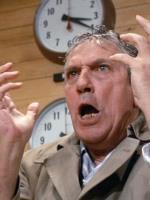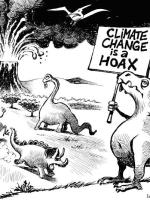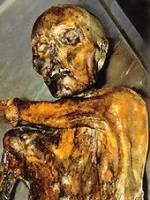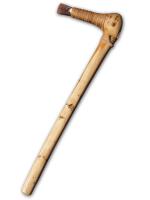 Yesterday was Paddy Chayefsky’s birthday. That got me thinking about the movie Network. That’s the film where just-fired longtime news anchor Howard Beale gives his farewell to the viewers and goes on to rant, “I’m mad as hell and I’m not going to take it anymore!” It’s a sentiment that pretty much everyone can identify with. The world is not fair and if you focus on on it, it is bound to make you angry.
Yesterday was Paddy Chayefsky’s birthday. That got me thinking about the movie Network. That’s the film where just-fired longtime news anchor Howard Beale gives his farewell to the viewers and goes on to rant, “I’m mad as hell and I’m not going to take it anymore!” It’s a sentiment that pretty much everyone can identify with. The world is not fair and if you focus on on it, it is bound to make you angry.
It is the ultimate example of populist rage. And so it isn’t surprising that the rich might be afraid of it. This morning in Politico, Ben White wrote, Why the Rich Are Freaking Out. As he put it, “The nation’s wealthiest, denizens of the loftiest slice of the 1 percent, appear to be having a collective meltdown.” And why? One example: “Residents of Manhattan’s tony Upper East Side say the progressive mayor didn’t plow their streets as a form of frosty revenge.” The heart bleeds for these people!
It reminds me of when I was first driving. My greatest fear was that I would get a traffic ticket and my insurance rates would go up. That is the kind of thing you worry about when you basically have nothing to worry about. Now I worry that the police will arrest me for looking at them wrong as I walk down the street. Other people worry that my government will drop a bomb on their houses. It’s all relative and I don’t blame the rich for freaking out over such little things. But that doesn’t mean anyone else should care that the lives of the rich are so great that they see revolution behind every snowplow delay.
Much of the concern that the rich feel comes from the Occupy Movement. But they never struck me as particularly angry. The group from the last few years that most exemplifies Howard Beale is the Tea Party Movement. They are the angry ones. They are the hysterical ones. They are the revolutionary ones. If we should be concerned about social disruption, it is the Tea Party and not Occupy that the rich should focus on.
People tend to forget what happens after Beale gives his big populist scream therapy session. First, of course, he becomes a big populist star. But increasingly, Beale talks about corporate control. This causes the rich to freak out, so Beale is taken to see the network’s chairman who, lit as though he were God, convinces Beale to preach the new world order where the little people don’t matter. Instead of “I’m mad as hell and I’m not going to take it anymore” it is “I’m mad as hell and there is nothing I can do about it.” So Beale is turned from a populist into a corporate mouthpiece. Unsurprisingly, rating slide and so the network assassinates Beale on the air.
There is a connection here to the Tea Party. Of course, the Tea Party was never populist. The group was basically a corporate creation. If it hadn’t been for Fox News and hate radio pushing it, it never would have gotten off the ground. That’s to say nothing of all the money that the Koch brothers and others put into it. And above all, the Tea Party didn’t start because of the bailout of the big banks. It was only after the government tried to help homeowners that the group started. So the Tea Party was never populist.
But in the beginning, they sounded populist. But very quickly, they became nothing more than a mouthpiece for the Republican Party. Now they are for the common conservative definition of economic freedom, which is just the idea that the rich should be able to do whatever they want. Constraints caused by poverty or private businesses are simply defined out of existence. They believe in the theoretical freedom to get rich and once rich to do whatever they please. It’s like they follow that evil bearded Spock in “Mirror, Mirror” with the philosophy: the needs of the few outweigh the needs of the many! (“I have been—and always shall be—your enemy.”)
Thus the rich do not fear the Tea Party Movement, regardless of how marginal they are with their rhetoric about armed rebellion and their embrace of gun culture. They do fear the Occupy Movement, regardless of how bureaucratic they are with their economic policy reports. But that’s the thing. Howard Beale is not the real threat that the rich fear. They aren’t worried about an armed rebellion. They are worried that the people might wake up to the unacceptable level of inequality that we face. They are worried that their taxes might be raised a little bit.
This is what’s behind the anxieties of the rich. To them, closing the carried interest loophole would be Kristallnacht. Maybe it’s already happened. Maybe that was what last year’s increase of the top marginal tax rate to 39.6% was. Regardless, they don’t fear populism; they fear democracy.
 I find it profoundly frustrating to talk about global warming. I don’t mind ignorant questions. Ignorant questions lead to informed clarity. What I hate are disingenuous questions. A common question that fits into both categories is, “If There’s Global Warming… Why Is It So Cold?” But I think most people now understand the difference between weather and climate. And they understand the difference between local and global. And they understand that global warming can cause unusual weather that we can’t predict. So when I hear that question, I now assume it is either just a global warming denier or it is someone whose thinking has been polluted by a global warming denier. Regardless, it is a question we must continue to answer.
I find it profoundly frustrating to talk about global warming. I don’t mind ignorant questions. Ignorant questions lead to informed clarity. What I hate are disingenuous questions. A common question that fits into both categories is, “If There’s Global Warming… Why Is It So Cold?” But I think most people now understand the difference between weather and climate. And they understand the difference between local and global. And they understand that global warming can cause unusual weather that we can’t predict. So when I hear that question, I now assume it is either just a global warming denier or it is someone whose thinking has been polluted by a global warming denier. Regardless, it is a question we must continue to answer.


 On this day in 1882,
On this day in 1882,  Yesterday was
Yesterday was